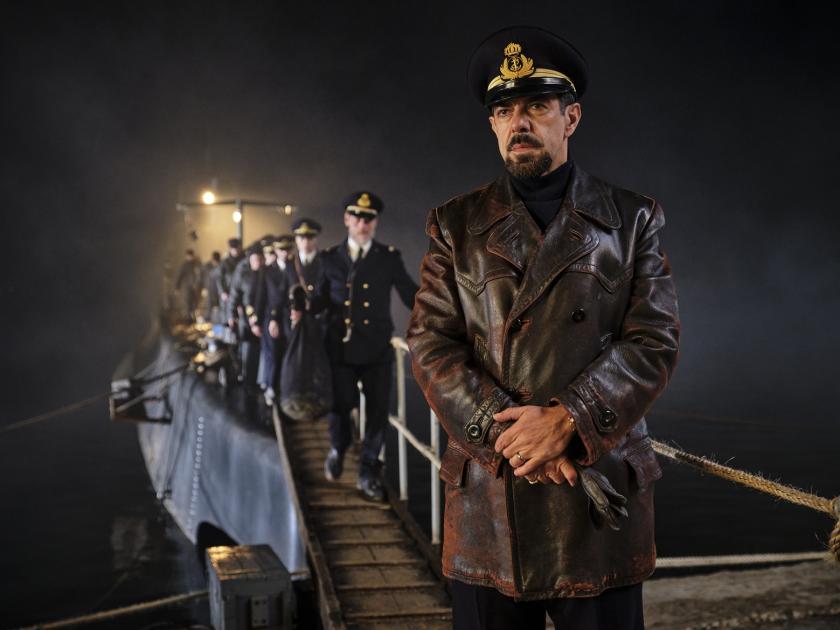Patriotic Italian films set during the Fascist war effort are understandably rare UK releases. Submarine commander Salvatore Todaro (Pierfrancesco Favino) was, though, an honourable warrior-poet who director Edoardo De Angelis seeks to separate from wider currents.
Roaming the Atlantic in October 1940, his lone wolf sub Comandante Cappellini sank a Belgian merchant ship during an exchange of fire. Contravening orders, maritime law and morality made him take 26 survivors onto his cramped vessel and sail them to neutral waters, staying on the surface and exposed to attack.
De Angelis introduces Todaro feet-first, falling into the sea and damaging his spine. Refusing the chance to be invalided out with his beautiful young wife, Rina (Silvia D’Amico, pictured below with Favino), he’s next seen readying the Cappellini’s crew for their first mission. There is unmistakable martial pride in the sailors’ march towards their sleekly powerful new vessel, partly recreated life-size at Cinecittà in a sign of this production’s ambition. Shore-life is recalled in impressionistic edits and voiceovers: the comforting memory of Rina’s body, and mournful inner thoughts among a band of women seeing their men off in the foggy dawn. Later a crewmember tasked with freeing the sub from a mine walks underwater and muses on mermaids before drowning. Todaro acknowledges his own reputation as “the craziest and wickedest commander in the Royal Italian Navy, an ascetic, a fakir, even a soothsayer”. Nicknamed Wizard Baku, he practises yoga in his pain-easing corset as paper seems to levitate around him. This is broadly true to the real Todaro, and suits De Angelo’s sometimes floridly poetic yet soft-spoken sensibility. Favino’s lead roles as the turncoat Mafioso in Bellocchio’s epic The Traitor (2019) and an exile foolishly returning to Naples in Nostalgia (2023) have showcased his imposing presence, mellifluous voice and soulful, deep-welled eyes. He gives Todaro romantic authority, like a seafaring TE Lawrence.
Shore-life is recalled in impressionistic edits and voiceovers: the comforting memory of Rina’s body, and mournful inner thoughts among a band of women seeing their men off in the foggy dawn. Later a crewmember tasked with freeing the sub from a mine walks underwater and muses on mermaids before drowning. Todaro acknowledges his own reputation as “the craziest and wickedest commander in the Royal Italian Navy, an ascetic, a fakir, even a soothsayer”. Nicknamed Wizard Baku, he practises yoga in his pain-easing corset as paper seems to levitate around him. This is broadly true to the real Todaro, and suits De Angelo’s sometimes floridly poetic yet soft-spoken sensibility. Favino’s lead roles as the turncoat Mafioso in Bellocchio’s epic The Traitor (2019) and an exile foolishly returning to Naples in Nostalgia (2023) have showcased his imposing presence, mellifluous voice and soulful, deep-welled eyes. He gives Todaro romantic authority, like a seafaring TE Lawrence. Alan Bleasdale’s TV film The Sinking of the Laconia (2011) similarly dramatised a U-boat rescue of torpedoed Italian POWs and British (which the Cappellini participated in under new command) and its unwitting attack by a US bomber, but the bitter ironies of war don’t concern De Angelis. Todaro’s men are implicitly cut adrift from Fascist Italy, despite proudly fighting its war, a suspect stance when parties with neo-Fascist roots dominate today’s nation. De Angelo was, though, inspired by an Italian Coast Guard admiral’s recent invoking of Todaro as politicians left refugees to drown. Todaro’s real-life explanation of selflessness verging on wartime lunacy is reduced to its essence here: “Because I’m Italian!” De Angelo revels in what this means at its best, from culinary pride (you didn’t get fresh gnocchi on Das Boot) to the crew’s chaotic regional melting pot, and Todaro’s “honey of the language of home”.
Alan Bleasdale’s TV film The Sinking of the Laconia (2011) similarly dramatised a U-boat rescue of torpedoed Italian POWs and British (which the Cappellini participated in under new command) and its unwitting attack by a US bomber, but the bitter ironies of war don’t concern De Angelis. Todaro’s men are implicitly cut adrift from Fascist Italy, despite proudly fighting its war, a suspect stance when parties with neo-Fascist roots dominate today’s nation. De Angelo was, though, inspired by an Italian Coast Guard admiral’s recent invoking of Todaro as politicians left refugees to drown. Todaro’s real-life explanation of selflessness verging on wartime lunacy is reduced to its essence here: “Because I’m Italian!” De Angelo revels in what this means at its best, from culinary pride (you didn’t get fresh gnocchi on Das Boot) to the crew’s chaotic regional melting pot, and Todaro’s “honey of the language of home”.
De Angelo’s ambitions settle down once the Belgians are sunk, unhurriedly following the quixotic mission. For all the modern touches, this ends as the kind of sea yarn Jack Hawkins helmed in the Fifties. The British ships which cease firing to let Todaro pass with his passengers also play their part in a solid drama of better natures.















Add comment